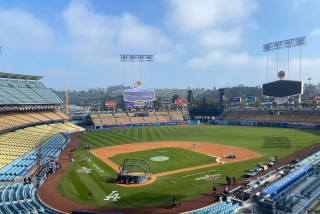Joy in Mudville, for Now : Baseball-Highlight Scramble Delayed
- Share via
Baseball fans will probably be able to watch a full complement of highlights from Opening Day games on their favorite local newscast tonight. But after today’s abbreviated schedule, that nightly luxury may soon be drastically curtailed, sports producers say.
The only reason that all the highlights are expected to be available now is that Major League Baseball has not yet put in place the equipment needed to scramble the satellite feeds of all major league telecasts.
Within the next two months, local producers report, the league will have succeeded in scrambling the feeds and local television stations, with the exception of KNBC-TV Channel 4, may have to do without highlights of many of this season’s games. KNBC isn’t affected because it has exclusive rights to a satellite news service that provides the station with complete sports highlights regardless of how many signals are scrambled.
Major League Baseball announced last winter that it was implementing the scrambling policy in an effort to protect its copyrighted telecasts from private satellite dish owners--especially bars and restaurants that use their free access to not-readily-available games to lure customers.
Spokesmen for the league have insisted that the policy is not designed to put the squeeze on local TV stations, which for years have used the unscrambled satellite feeds free of charge to glean most of their sports highlights. But as a result of this new development, stations will no longer have free access to every game played each night. In some cases, sports producers report, they might not even have access to highlights of games played in their own cities.
“Major League Baseball has assured us that half the games (on any given night) will still be available unscrambled,” says Tony Richards, sports producer at KHJ-TV Channel 9. “But almost every Dodgers and Angels game will be scrambled. We may have nights where we just show the score of the Dodgers game, and then full highlights of the Astros against the Braves.”
The league insists that some games that are carried by regional sports channels will still be available to local stations because many of them are delivered unscrambled, via satellite. L.A. stations will also have complete access to any Dodgers games televised by KTTV Channel 11 and any Angels games broadcast on KTLA Channel 5.
The Z Channel, the pay-cable outlet that plans to broadcast 35 Dodgers and 35 Angels home games, has also agreed to provide local stations with a clear feed of its telecasts as long as the stations credit the cable channel on the air.
To ensure access to everything else, stations will have to pay.
Decoders that unscramble satellite feeds cost $3,500 each and since many games are played simultaneously, each station will have to purchase several decoders to record all the scrambled games. Stations will also have to pay an administrative fee of $250 a month per decoder.
While the total cost to each station is less than originally anticipated--it was thought that stations would have to pay an additional $50 for each game they descrambled--sports producers are incensed that they would have to pay even one cent to provide what they call “free nightly publicity” for the league and the local baseball teams.
After the league convinced them that the scrambling of satellite feeds was a fait accompli, Richards said that local sports journalists met with representatives of the Dodgers and Angels and asked that they help defray some of the additional cost to the stations in return for the guarantee that highlights of their teams would continue to air on every channel every night.
Last week, however, a representative from the Angels informed Richards that the club would not subsidize the cost of the decoders for any local station.
“We’re approaching this with a wait-and-see attitude,” said Tom Seeberg, vice president in charge of public relations for the Angels, who confirmed that the Angels did not intend to help the local stations out financially. “It’s a question of creativity. The stations want to be able to do their own thing and not have to rely on news services or other sources for their highlights. We’ll have to see if it really alters the local newscasts.”
Tommy Hawkins, director of communications for the Dodgers, said no formal request for assistance from any local station had been brought to his attention. However, he said that the scrambling policy was a league decision and that the Dodgers planned to go along with it.
None of the local stations has purchased decoders nor have they made any plans to do so. A spokeswoman for KCBS-TV Channel 2 said that buying a decoder and paying the administrative fee would be “akin to paying for news.” But she also noted that the news department, confident that it would have access to highlights for at least the first week of the season, was still trying to figure out what to do.
When the scrambling policy was announced, Channel 5’s sportscaster Keith Olbermann talked about organizing a boycott of all baseball highlights from Day One of the new season. Given the two-month grace period before all the signals will be scrambled, he is now hoping that some kind of compromise--either with the league or the local teams--can be worked out before such measures are necessary.
Many in local sports are skeptical that a boycott would be effective because Channel 4, with its exclusive news service, would still be able to provide local fans with complete coverage of all the games.
More to Read
Go beyond the scoreboard
Get the latest on L.A.'s teams in the daily Sports Report newsletter.
You may occasionally receive promotional content from the Los Angeles Times.










